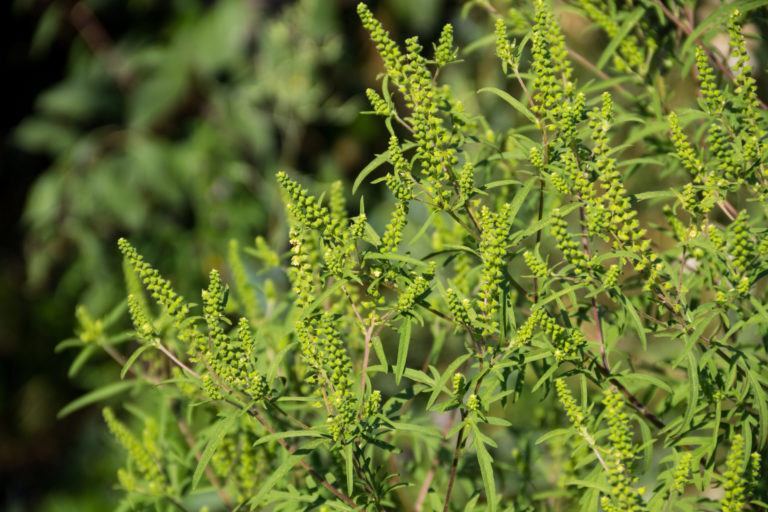Last updated on November 20th, 2023 at 11:24 am

In just a few weeks, billions of grains of pollen from ragweed plants will begin to invade the air. This pollen travels far and wide, even hundreds of miles away. It’s no wonder that as many as 23 million Americans are sensitive to ragweed pollen, making it the most common and bothersome allergen. Chances are many more will develop ragweed allergies and symptoms will intensify as warmer temperatures have extended this noxious plant’s flowering season.
Many people turn to antihistamines to relieve their ragweed allergy symptoms but they can dry you up and leave you feeling drowsy. Homeopathy has a better solution specifically targeting ragweed pollen sufferers that contains an active ingredient that’s truly unique.
A Nasty Little Plant
With a name that harkens back to the immortal food from Greek mythology, one would think that Ambrosia artemisiifolia, or ragweed, is a beautiful plant. But that is not the case. Common ragweed is an invasive plant that grows across almost all of North America and is especially prevalent in eastern and central U.S. It thrives in both rural and urban areas, preferring places where the soil has been farmed or disturbed, such as along roadsides, riverbanks, and in vacant lots and fields. Ragweed plants can be identified by their distinct leaves and flowers. The leaves have a hairy, fern-like appearance, and the flowers are green, growing upright in a rod shape.
As a summer annual, ragweed only lives for one season and then dies. Still, each plant produces thousands of seeds and millions of sticky pollen grains that travel with the wind, causing sneezes and itchy, puffy eyes in their wake. Ragweed pollen has been measured 400 miles out to sea and two miles up into the atmosphere, making this allergen problematic even to those who don’t live in its growing zones.
The Homeopathic Solution
Homeopathy has a unique solution for ragweed allergies called Ambrosia artemisiaefolia, which is a medicine made from this plant. That’s because, in homeopathy, microdoses of certain substances help the body overcome the same symptoms they cause. To make the medicine, ragweed is steeped and macerated in alcohol to create a tincture. It is then homeopathically diluted so that it can be used for symptomatic relief.
Ambrosia artemisiaefolia in the 30C dilution is recommended for relieving itchy throat and nose, sneezing, runny nose, and irritated eyes associated ragweed allergies.* If you’re sensitive to ragweed, this is one medicine you’ll want to have on hand to use throughout the flowering season, which typically lasts from late July to either October or November, depending on when the first frost occurs in your region. Simply take 5 pellets three times a day as soon as you experience symptoms. You can also take Ambrosia artemisiaefolia 30C prior to ragweed exposure when heading outside, traveling, or camping.
You can find Boiron Ambrosia at natural product stores and online.
*Claims based on traditional homeopathic practice, not accepted medical evidence. Not FDA evaluated.






